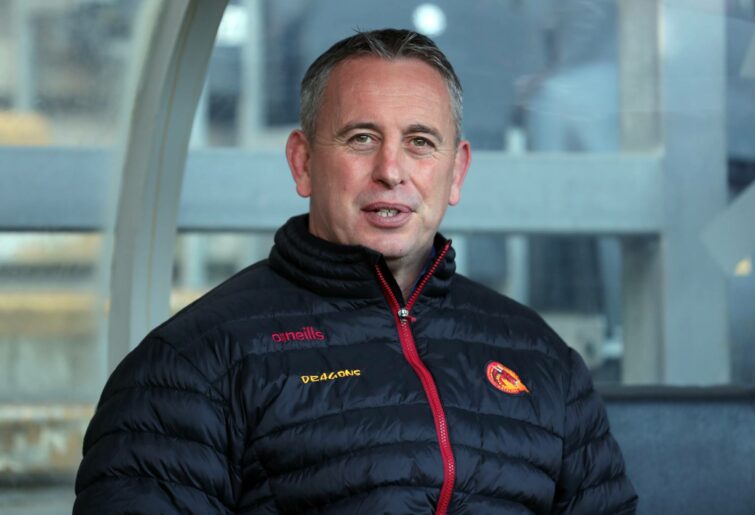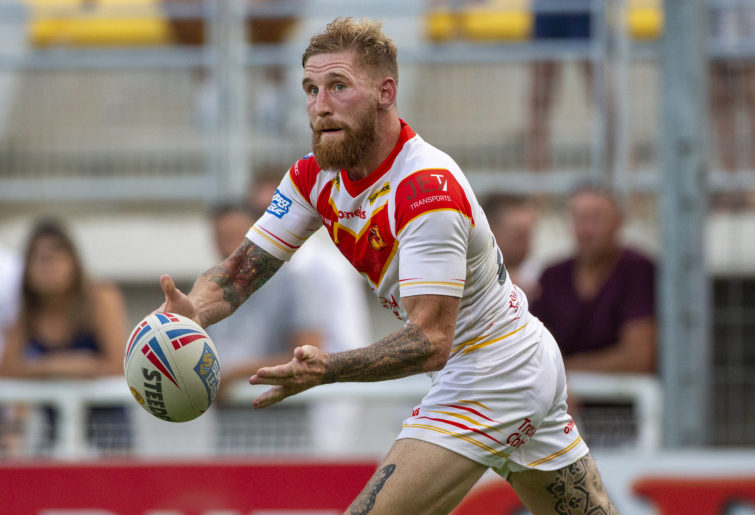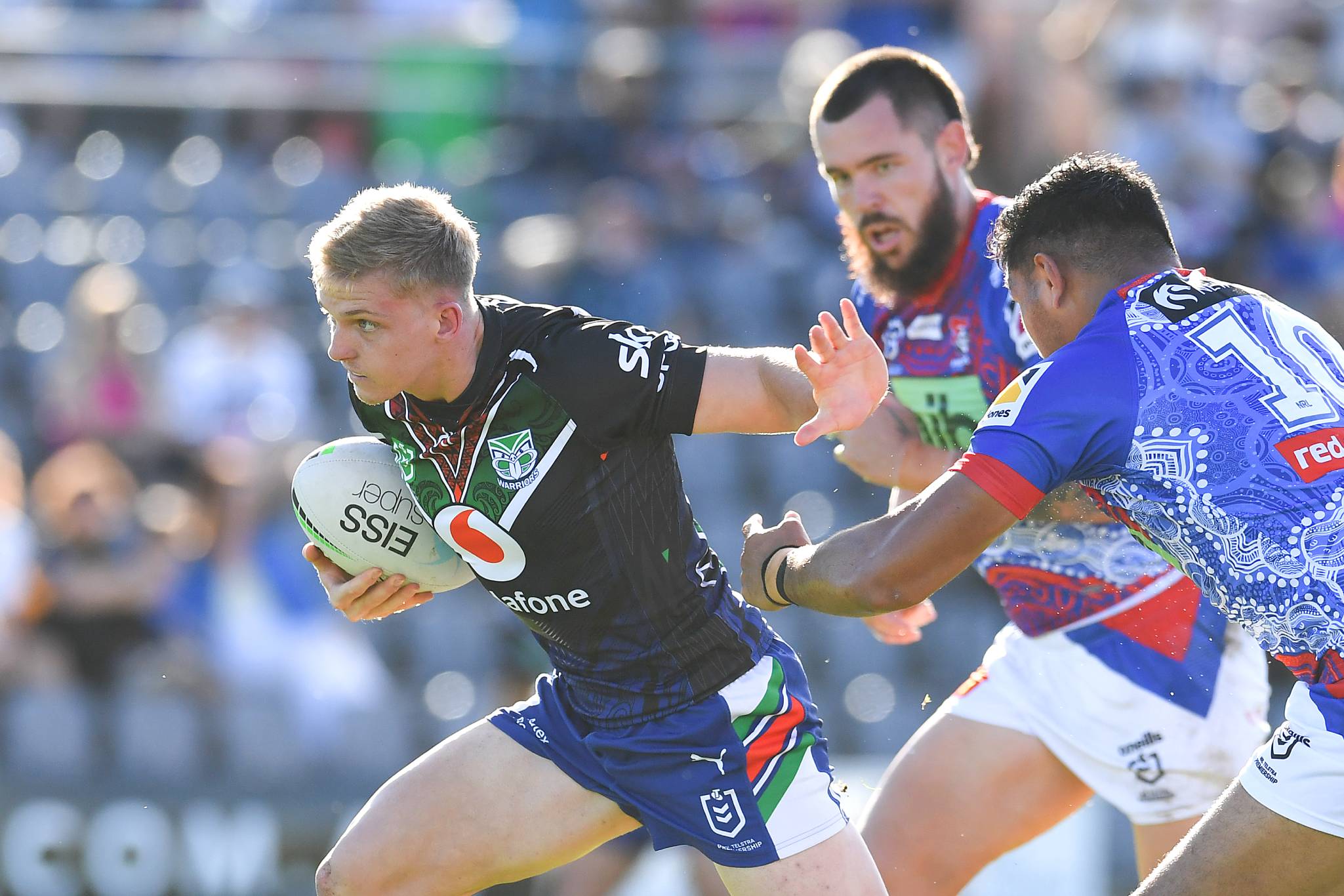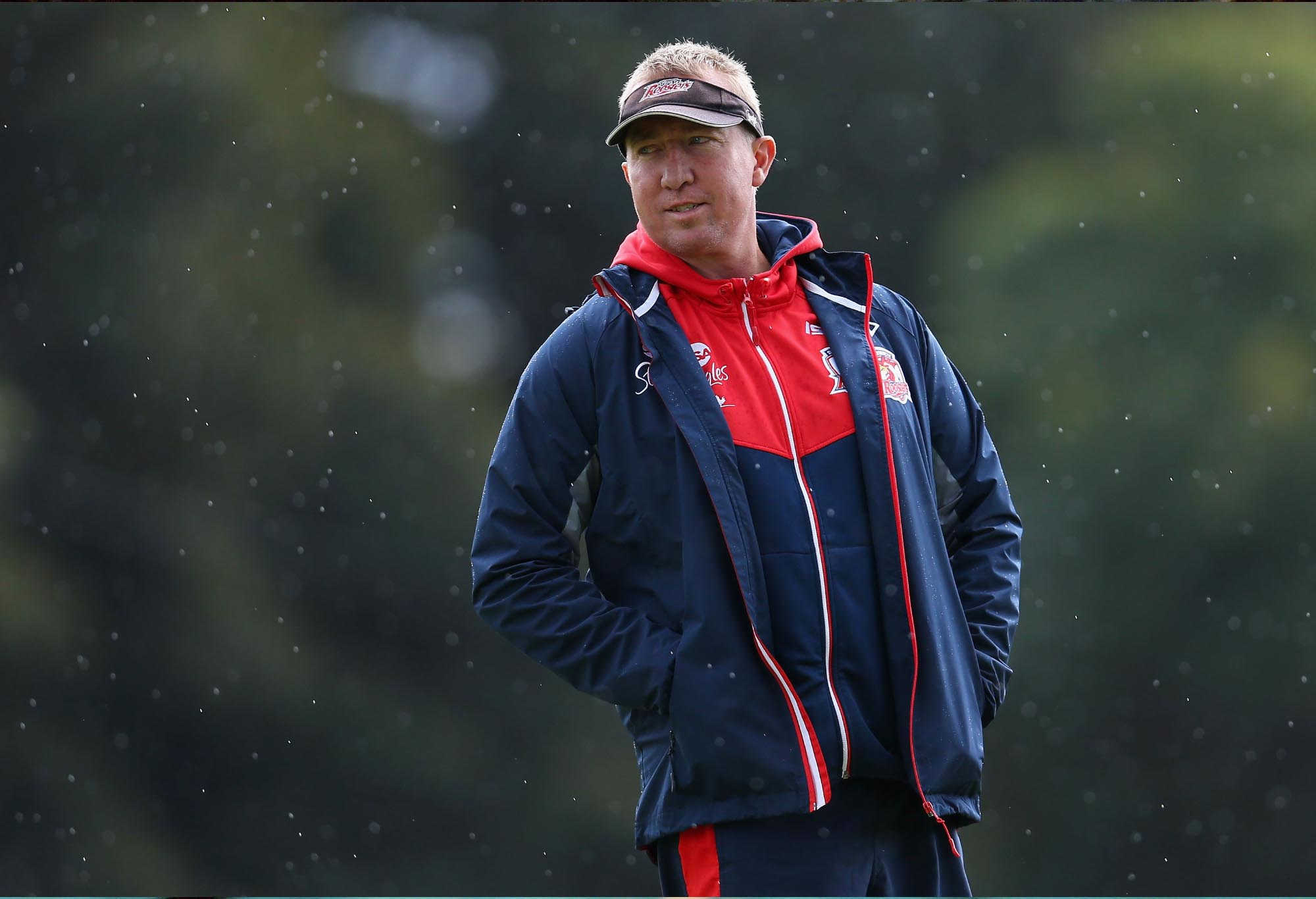The NRL coaching merry-go-round is in full swing, with three jobs up for grabs across the Wests Tigers, Canterbury Bulldogs and New Zealand Warriors.
Add in a high likelihood that more will follow given the insecure situations of Justin Holbrook at the Gold Coast Titans and Adam O’Brien at Newcastle Knights.
The qualifications to be one of the select band of anointed successors appear to fall into three categories.
You could have won a comp previously – see Flanagan, Shane and Green, Paul – or have been part of a system that has, like Cameron Ciraldo at the Panthers or the newest coach in the NRL, Craig Fitzgibbon at the Sharks, or won a Super League, like Kristian Woolf at St Helens.
There’s some gaping holes in the logic that runs through this. Firstly, winning a comp is necessarily very hard and very rare – only one bloke a year can do it – and thus lots of good coaches don’t win one.
As Michael Maguire’s reign at the Wests Tigers would suggest, it doesn’t count for much down the line.
Secondly, being an assistant coach in a strong system is great, because you’re learning from the best, but isn’t always transferable to a top job.
Ciraldo is a good coach, but the skills required to turn the sort of club that sacks their coach around are, obviously, very different to those that deliver Premierships to clubs that are already successful.
Thirdly, winning Super League is hardly a guarantee either. For a thousand structural reasons I don’t have anywhere near enough time to go into, plenty of clubs don’t enter the competition realistically thinking of how they might win it.

Catalans Dragons’ coach Steve McNamara during the Super League match at the KCOM Stadium, Hull. (Photo by Richard Sellers/PA Images via Getty Images)
Only four clubs ever have – one of which, Bradford, has subsequently been relegated – meaning that if you get a job at Saints, Wigan or Leeds, you’re essentially a one-in-three chance of winning the league.
The subsequent NRL careers of Nathan Brown and Justin Holbrook, both winners at Saints, would suggest that titles in Europe aren’t worth too much.
All those factors make it baffling, to me at least, that Steve McNamara is not considered for any of the three jobs going in the NRL currently, and particularly that at the New Zealand Warriors.
McNamara has all of the three things that qualify you to be an NRL coach in waiting – high-level head coach experience, successful system NRL experience and Super League success, but in a way that is far, far more transferable to the current vacancies than any other candidate.

(Photo by Tim Clayton/Corbis via Getty Images)
McNamara is currently coach at the Catalans Dragons, a team that he has taken from the brink of relegation from Super League to their first-ever silverware – the 2018 Challenge Cup – and the 2021 minor premiership and Super League Grand Final, where they were narrowly defeated by St Helens. They’re currently second in the ladder, again behind Saints.
On top that, he worked under Trent Robinson at the Sydney Roosters during their run of Minor Premiership victories in 2014 and 2015, as well as with Stephen Kearney at the Warriors in 2017.
He was also England coach from 2010-2015, taking them to within seconds of World Cup final. As CVs go, it’s right up there with anyone currently on the market. Yet he doesn’t get a sniff.
It’s more than just the history, however. The Warriors, historically, have struggled with consistency, maintaining culture and developing a playing style that is authentic to them as a Kiwi team, but also competitive in the NRL.
McNamara’s transferable skills, in terms of building culture, integrating diverse playing groups and bringing through players are well-established and would be a perfect fit for New Zealand. Basically everything you think of currently about the Warriors franchise would have also been true of the Catalans – until McNamara joined in 2018.
I rang up Steve, and while he was quick to point out that he was very, very content in the south of France, he was happy to talk about his work with the club and how it informed his work with the Catalans.
“I have an affinity with the Warriors, having spent a year there, and at the Roosters for three years as an assistant,” he said.
“It was a really good grounding for the Catalans job working at the Warriors. One of the reasons that I wanted to have a look at it was having a different environment and set up.
“At the Roosters, it’s a long-established environment and the Warriors was more new franchise in a different country, and it was good grounding for me to help me here.
“I’m extremely happy here at Catalans, it’s a great place to work, and we’re on our way to hopefully some success.
McNamara has a long association with the game in Australia, having played reserve grade in the early 1990s and then coached in the NRL.
“I was 19 when I went to Australia,” he said. “I was a player at Hull FC when we still played in the (European) winter, and I was fortunate to be coached by Brian Smith, who went to St George and took me across.
“The perception is that Hull lads don’t travel, we get a nosebleed when they get outside of Hull, but at the age of 19 I experienced Australia and the lower grades and fell in love with it. I’ve had numerous trips across there and enjoyed it.
“I’m extremely happy in the role that I’m in now and extremely happy with the jobs that I’ve done previously and the experience that it’s given me.
“Ultimately at some point with the NRL, if a great opportunity somewhere down the track presented itself, it wouldn’t phase me or scare me, but it’s not something that I’m particularly aiming at at this stage.”
The Catalans are the most comparable club in the world to the Warriors, because they exist in the same logistical and cultural environment.
They travel every second week to away games in England, and have endured similar hardships during Covid, often being forced to fly in, fly out on gameday on private jets to avoid quarantine regulations, with huge disruptions to training. Despite that, they finished top in 2021.
The Warriors should be battering down his door given how he took the Dragons from dead last to the Minor Premiership in just three years.
“The Catalans were rock bottom, 40 minutes away from losing our Super League status, and there were clearly some areas where we had to clarity back into our team and who we were as a club,” he said.
“It was traditionally seen as a place that people came to enjoy the benefits of living in the south of France, the beaches and the snow and all of that, and they played rugby second.
“We quickly changed that: it is a great place to live, but only if you’re doing your job first. There was a real mindset shift we had to make.
“There had to be a real trust between myself and the group of predominantly French-speaking players, where we couldn’t speak freely.
“Building that trust when you can’t speak is a real challenge and one that I enjoyed and took on.
His ability to bring the best practice learned from his time in the NRL and with England, while keeping a uniquely French atmosphere should make Cameron George’s ears prick up.
“First of all, you have to respect the country that we’re in and the culture that is here,” said McNamara.
“We adapt ourselves to that to a certain extent, but also educate the people here that if you want to be a top end professional sportsperson, some of those cultures and behaviours don’t necessarily sit side by side with being a top end player.
“We laugh and joke about it, but the bread and wine is a big thing in France. Drinking wine and eating bread at each meal is a big thing. Quite clearly, if you did that every meal, it’s not conducive. So you might take the wine off them every lunchtime but won’t touch the bread.
“That’s a simple way of talking about it, but it’s education of the group in what is required and the standards that are set.
“We did that as staff and brought outstanding competitors in Michael McIlorum and Sam Tomkins from England who helped show the way. Ben Garcia, our captain, already had those traits because he’d travelled to Australia and seen it.
“Once you get three people like that, it soon becomes four, then six, then ten and suddenly your whole group swings that way, whereas physically when I arrived, we were a mess.
“We needed to change that department and we did. Now the young boys that are coming through, their first impression is what they see now, which they see as the way forward. A young boy coming in six years ago would see a completely different culture and go with it.
“It’s about respecting the area that we live in and what they do, but we play in an English competition against mostly English players with English referees and we have to act differently at different times to make sure we compete.”

(Photo by Albert Perez/Getty Images)
For a club that is currently losing the best Kiwi talent to Australian-based rivals, the allure of a guy who managed to retain local players, combine them with faces from elsewhere and then create a culture that took the best of both worlds should be obvious.
McNamara’s history as a talent developer is right up there with the best in Europe. As Bradford coach, he gave debuts to Sam, George and Tom Burgess, Elliott Whitehead and brought John Bateman through the youth set-up.
“We brought good players in from overseas, and people talk about those as being the catalyst, but really the biggest benefit has been the development of the French players within our organisation,” he said.
“Our top French players are as good as any in the competition, and our young French players have seen the professionalism that has been brought by the staff and the senior players.
“Our performance environment is outstanding and they are now developing into outstanding rugby league players, and as time passes on, it will be their job to pass those traits to the next generation.”
On the field, McNamara’s style is heavily informed by his time as a player under Brian Smith and Royce Simmons, and his philosophy is based on a combination of their styles.
“I was really lucky because my first professional coach was Brian Smith, and I feel it was the biggest thing in my career,” he told me.
“I was 17 and, without doubt, the best educator of rugby league I’ve ever had. He’s the A-Z of rugby league, and his knowledge of the game in all areas was incredible. The philosophy of not going into games to lose games, but going in to win.
“The way he set his teams up, and how he could change things from one week to the next was incredible. My knowledge from him at an early age was massive.
“Another Australian I came across was Royce Simmons, and he was completely different to Brian but just as valuable. He really taught me the benefit and merit of effort-based rugby league, the tough parts and the basic parts.
“He ran five marathons in five days as a coach to raise money sign Des Hasler (to Hull FC), which taught me just how far effort-based areas can get you as well.
“That ties in with the defence and, for me at the Catalans, it’s a combination of trying to get steely defence but then an attack that flows and has a rhythm about it, that has a lot of supports.
“It’s a high energy type of game and you have to be fit, and that if you want to win the competition, you have to have those elements together. For me, it’s a combination of those two things.”
It certainly seems to be working. His winning percentage is higher than that of Flanagan or Green, for example, and while Super League is a weaker competition than the NRL, it is still a highly competitive one in which he took perhaps its more underperforming team and turned them into one of the biggest hitters.
Furthermore, while winning the Super League gets you in the NRL conversation – if you are Australian at least – the most commonly held former club among first grade coaches, including all NRL clubs, is actually the Catalans Dragons.

Trent Robinson (Photo by Jason McCawley/Getty Images)
Trent Robinson, Kevin Walters and Mick Potter all did time in the south of France before graduating to top jobs in Australia, and none of them did as well as McNamara.
Their best previous finish, before last year’s minor premiership, was third under Potter in 2008.
McNamara doesn’t have a manager and deals with his own career himself, and thus is never spoken about for NRL jobs. I spoke to Brian Smith and asked him if he was surprised that his former player wasn’t spoken about for head coaching roles in Australia.
“Yes and no” he told me. “I am surprised because he’s got a lengthy track record of success, and a CV of contacts with many number of head coaches and positions of responsibility.
“Anyone who knows him or has worked with him, speak in glowing terms of him. Both as a guy and a footy coach.
“I’m not surprised because NRL clubs just seem to go to the same well all the time. They’re making popular decisions, popular with the media, and Steve isn’t one who hawks himself around as some do. He’s a gem in the waiting.
Smith worked at the Warriors after McNamara left and made the contacts for Trent Robinson to move to France before returning to Australia to replace him at the Roosters.
He told me McNamara had learned the crucial skills of when dealing with diverse playing groups while at the Roosters under Robinson, and then applied them to the French players he had at the Catalans.
“Anyone who ignores that is crazy,” said Smith. “Steve is ahead of the pack with his experience. It should be bog standard for any NRL coach, with the growing number of players with Polynesian backgrounds.
“The reason I contacted the Catalans about Trent was because – aside from his obvious coaching abilities – was because he was French-speaking and married to a French woman.
“I asked them why they hadn’t contacted him, and what I spoke about was about his competencies – the Catalans wanted to know why I was getting rid of him!
“With Steve having worked with Trent, he’s been able to embrace it as an Englishman. He has embraced those cultural competencies.”
Robinson himself told me that McNamara was a better bet than he himself had been when he made the transition from Super League to the NRL.
“Steve has shown his pedigree as a coach both over here, back in Super League and at international level with England. The form is there,” said the Roosters coach.
“If you want a young, hungry coach with form, then Steve Mac is definitely at that level to take on an NRL coaching job. We speak often enough, I know he’s a hungry coach.
“The barrier is slightly cultural. I think there’s some very good coaches in Super League, but because they’re English – and to be honest, not enough people watch Super League and don’t value the coaching that goes in there – they see it as taking a punt.
“Mac played at a high level, coached at a high level and he’s less of a punt than what I was. We should definitely we looking at those coaches.”
































































































